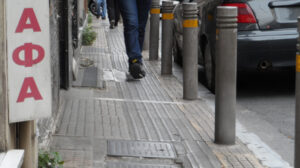A report by the Sunday edition of Thema—highlighting the dire state of sidewalks—prompted the Supreme Court (Areios Pagos) to rule that a municipality must compensate a citizen injured due to lack of sidewalk maintenance. The Ombudsman took notice of the ruling and pressed the Attica Mayor to take responsibility, leading to urgent sidewalk repairs after a citizen’s injury.
At the start of the year (January 5, 2025), Thema reported:
“With the Supreme Court’s seal of approval, municipalities bear the responsibility for sidewalk repairs, ensuring they are free of potholes, broken slabs, etc.
In the event of a pedestrian injury, municipal officials (mayor or deputy mayor) face criminal liability in addition to civil liability for covering medical expenses, financial compensation for moral damages, etc.
An unfortunate 64-year-old woman, while walking a significant distance from her childhood home, tripped over a raised and damaged slab, fell to the ground, and was injured.”
The Ombudsman’s legal expert, Aimilia Liaska, noticed the report and retrieved the Supreme Court ruling referenced in the article. She then convinced an Attica mayor to take action following a complaint by a citizen who suffered a metatarsal fracture due to sidewalk neglect.
Initially, the mayor tried to shift the responsibility for sidewalk maintenance onto adjacent property owners.
However, Liaska, in collaboration with the Deputy Ombudsman, Dafni Filippaki, sent a follow-up notice, citing the Supreme Court ruling. This finally broke the mayor’s resistance.
Specifically, a citizen approached the Ombudsman, reporting a serious injury (a metatarsal fracture) caused by poorly maintained sidewalks and roadways.
According to the Ombudsman’s findings:
“On Pythagoras Street, tree roots have lifted pavement slabs, posing a serious tripping hazard for pedestrians. Additionally, parked cars frequently obstruct sidewalks, making them impassable and restricting access for people with disabilities or mobility impairments.”
The Ombudsman formally notified the municipality, warning that the current state of the road and sidewalks posed a public safety risk.
In response, the municipality insisted that adjacent property owners were responsible for sidewalk maintenance.
However, the Ombudsman countered by referencing Supreme Court Ruling No. 532/2024 from the Sixth Criminal Division, which had been published in Thema. The ruling explicitly stated that municipalities hold criminal and civil liability for sidewalk repairs in cases where a pedestrian is injured—including obligations to cover medical expenses and compensation for moral damages.
The Supreme Court ruling, as cited by the Ombudsman, clarified:
“While adjacent property owners are technically responsible for sidewalk maintenance, the municipality has a duty to oversee their condition and take appropriate measures for upkeep and repairs. This ensures safe pedestrian movement and protects their physical well-being in public spaces.”
Following the Ombudsman’s intervention, the municipality confirmed that immediate sidewalk repairs would take place at the specific location, with funding from the Green Fund.
Additionally, the Ombudsman urged the municipality to implement a systematic maintenance plan and enhanced inspections of public spaces under its jurisdiction.
Ask me anything
Explore related questions





